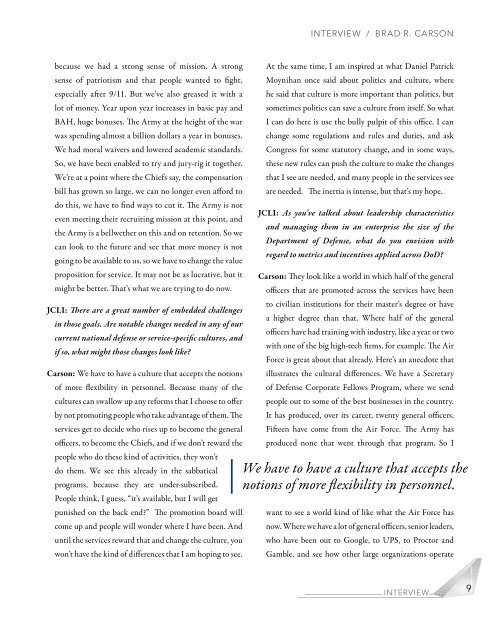PROFESSION OF ARMS
Yi5mwL
Yi5mwL
You also want an ePaper? Increase the reach of your titles
YUMPU automatically turns print PDFs into web optimized ePapers that Google loves.
INTERVIEW / BRAD R. CARSON<br />
because we had a strong sense of mission. A strong<br />
sense of patriotism and that people wanted to fight,<br />
especially after 9/11. But we’ve also greased it with a<br />
lot of money. Year upon year increases in basic pay and<br />
BAH, huge bonuses. The Army at the height of the war<br />
was spending almost a billion dollars a year in bonuses.<br />
We had moral waivers and lowered academic standards.<br />
So, we have been enabled to try and jury-rig it together.<br />
We’re at a point where the Chiefs say, the compensation<br />
bill has grown so large, we can no longer even afford to<br />
do this, we have to find ways to cut it. The Army is not<br />
even meeting their recruiting mission at this point, and<br />
the Army is a bellwether on this and on retention. So we<br />
can look to the future and see that more money is not<br />
going to be available to us, so we have to change the value<br />
proposition for service. It may not be as lucrative, but it<br />
might be better. That’s what we are trying to do now.<br />
JCLI: There are a great number of embedded challenges<br />
in those goals. Are notable changes needed in any of our<br />
current national defense or service-specific cultures, and<br />
if so, what might those changes look like?<br />
Carson: We have to have a culture that accepts the notions<br />
of more flexibility in personnel. Because many of the<br />
cultures can swallow up any reforms that I choose to offer<br />
by not promoting people who take advantage of them. The<br />
services get to decide who rises up to become the general<br />
officers, to become the Chiefs, and if we don’t reward the<br />
people who do these kind of activities, they won’t<br />
do them. We see this already in the sabbatical<br />
programs, because they are under-subscribed.<br />
People think, I guess, “it’s available, but I will get<br />
punished on the back end?” The promotion board will<br />
come up and people will wonder where I have been. And<br />
until the services reward that and change the culture, you<br />
won’t have the kind of differences that I am hoping to see.<br />
At the same time, I am inspired at what Daniel Patrick<br />
Moynihan once said about politics and culture, where<br />
he said that culture is more important than politics, but<br />
sometimes politics can save a culture from itself. So what<br />
I can do here is use the bully pulpit of this office. I can<br />
change some regulations and rules and duties, and ask<br />
Congress for some statutory change, and in some ways,<br />
these new rules can push the culture to make the changes<br />
that I see are needed, and many people in the services see<br />
are needed. The inertia is intense, but that’s my hope.<br />
JCLI: As you’ve talked about leadership characteristics<br />
and managing them in an enterprise the size of the<br />
Department of Defense, what do you envision with<br />
regard to metrics and incentives applied across DoD?<br />
Carson: They look like a world in which half of the general<br />
officers that are promoted across the services have been<br />
to civilian institutions for their master’s degree or have<br />
a higher degree than that. Where half of the general<br />
officers have had training with industry, like a year or two<br />
with one of the big high-tech firms, for example. The Air<br />
Force is great about that already. Here’s an anecdote that<br />
illustrates the cultural differences. We have a Secretary<br />
of Defense Corporate Fellows Program, where we send<br />
people out to some of the best businesses in the country.<br />
It has produced, over its career, twenty general officers.<br />
Fifteen have come from the Air Force. The Army has<br />
produced none that went through that program. So I<br />
We have to have a culture that accepts the<br />
notions of more flexibility in personnel.<br />
want to see a world kind of like what the Air Force has<br />
now. Where we have a lot of general officers, senior leaders,<br />
who have been out to Google, to UPS, to Proctor and<br />
Gamble, and see how other large organizations operate<br />
INTERVIEW<br />
9


